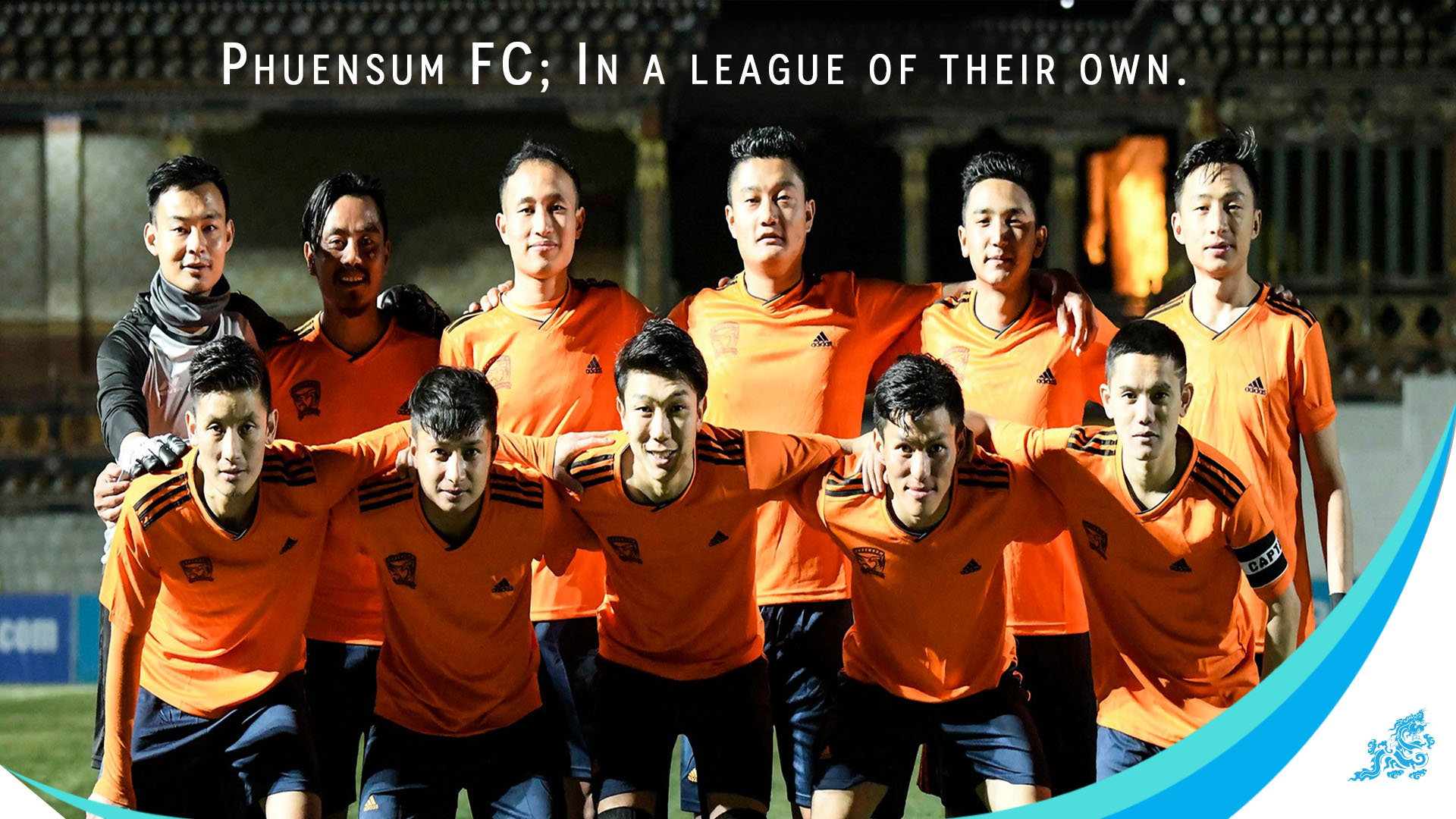The story of Phuensum FC’s rise and fall
Thinley Namgay
Three straight wins, two hatricks in three games, a clean sheet and an overhead (bicycle kick) goal that could contest for the goal of the season. This is the story of Phuensum football club (FC) so far who is leading the Thimphu District League in group B.
The perfect start to the league started with the humbling of Takin FC (5-1) and brushing aside Yal FC (2-1) and Motithang FC 3-0 on Thursday. If the club can maintain that record until the end of the season, they will join six other clubs to compete in the A league.

Phuensum FC was formed in 2015
For Phuensum FC, the A league is not a new competition. They had competed at the highest level for a season. The debut season in 2018, however, ended with Phuensum FC returning to the then B division league.
Will Phuensum FC return to the top?
The team has stuck together. About a dozen players from the A league stint are still with the club that could be the difference in their winning streak. However, Phuensum FC’s story is a typical story of many football clubs.
In 2015, a group of childhood friends, all football enthusiasts, from Babesa, Thimphu, got together and formed Phuensum FC. The club had no coach and fund. In two years, they qualified to compete in the B league. In the third attempt to qualify for A league, they made it together with Tensung FC.
“We started from scratch. We came from nothing, but the opportunity to compete in the A division league was our major achievement,” club tactician and player, Samir Rai said. Samir recalls how difficult it was to compete in the A league, not because of competence or willingness to work relentlessly, but because of finance.
Unlike other A league clubs with big sponsors, Phuensum FC depended on the generosity of the parents, uncles and aunts for funds. The main man behind the club, Nim Dorji, who was a player and who became the default president invested whatever he had from his small construction business into the club. He paid the salary, mostly in installments, house rents, and every other expenses, said Samir.
Relatives and friends sponsored refreshments, mostly momos, tea, Shamdey (a type of fried rice) and water during matches. An uncle of a player’s uncle went around seeking donations, which didn’t bring much. But Phuensum FC stuck and fought together.
The Bhutan Football Federation (BFF) allowed A league clubs to hire international players. There were many in the bigger clubs like Thimphu FC, Transport United FC and Thimphu City FC. Phuensum got a tall and lanky Congolese, Eric, studying in India and one from Jaigaon, Ramesh. Keeping them happy and fit to play became a challenge. Eric was put up in a rented apartment in north Thimphu. Picking and dropping him became a problem. The club had only a Bolero pickup truck, belonging to the president. When the pick-up truck was engaged in the construction works, Eric had to hire a taxi to report to training session and to go back home. Eric was paid Nu 40,000 and Ramesh 35,000. “They didn’t complain as they were happy to be in Bhutan,” said Nim Dorji who is now in Australia and sponsoring the club. The club couldn’t afford a certified coach. BFF considered not having one and Phuensum competed without a professional coach.
On the ground, Phuensum FC did well. They drew their first game with Tensung FC with Tashi Tshering saving the team in the 90th minute to equalise. Next came Transport United, the defending champion. Phuensum’s Sonam Wangchuk scored in the 70th to stun Transport Utd, but lost the lead three minutes later. Two games and two points was not a bad start. Their first loss was a narrow loss to Thimphu FC by a goal to nil. They went down eventually with only one win.
“Despite being financially and technically disadvantaged, we challenged big clubs in the national league. The goal difference used to be negligible, although we were again relegated to B division,” said Samir Rai.
Phuensum FC may be small, but they have big ambitions. “Our aim is to play in the Asian Federation Cup and support the youth,” said Samir. “Today, among the 18 players with the club, the younger ones are given more opportunity to play games to showcase their talent and get experience.”
But there is a lot of work to do. There is no recruitment procedure for players. The club recruits players through their network of friends. The club is also without a head coach. Samir works between being a tactician and coach. “We can’t afford a coach as we have to pay more than Nu 100,000 in a season.”
BFF supports local clubs to compete in the league with Nu 60,000 this season. According to Samir, Nu 30,000 was spent on uniforms, and the remaining amount was given to the players.
On the development of football, Samir Rai said that BFF needs to give clubs more time to practice if not develop more infrastructure. “Currently, we get one month to practice before league. BFF used to allocate the teams two hours a day for training. It is not enough. At least two-month practice is needed. Sometimes we had to practice in the mini pitch, which is uncomfortable,” he said.
Keeping a tab on his club, President Nim Dorji is encouraged and confident that Phuensum FC will qualify for the A league. However, he is already worried about competing in the A league. “We need to sign good players to compete at the highest level. Without funds, it is impossible,” he said.

